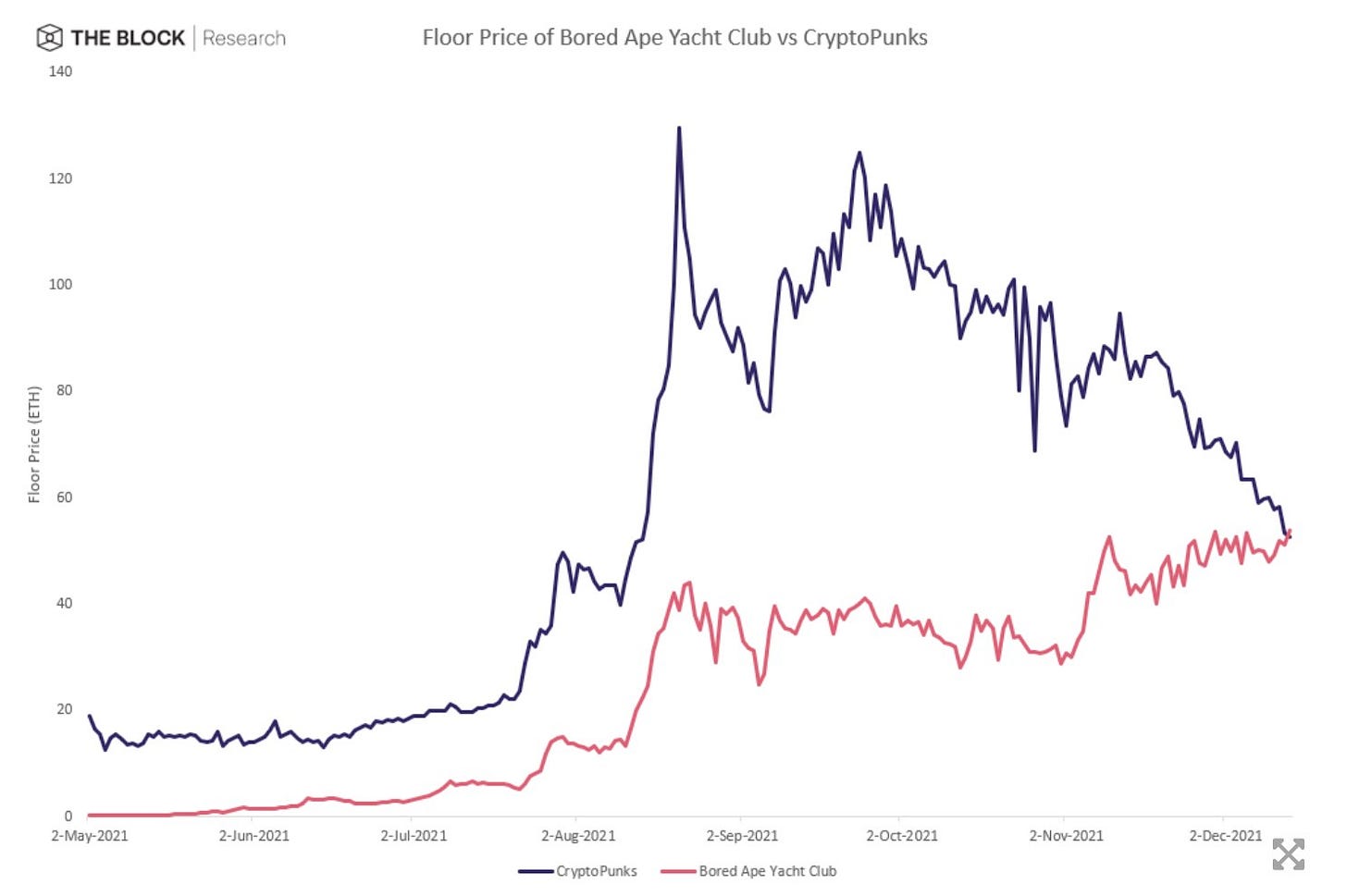The Rise of the Fashion of the Apes
Plus a list of my favorite crypto skeptics and an unexpected new use case for NFTs
In this issue:
The Rise of the Fashion of the Apes
How to spot a skeptic in a crowd (reader submitted)
What makes a dollar valuable? (reader submitted)
The Rise of the Fashion of the Apes
Disclaimer: I own a BAYC, MAYC and BAKC. I recommend treating NFTs as entertainment objects and not as investment vehicles.
Pictured above are two very expensive cartoon drawings of monkeys. The one on the left belongs to Snoop Dogg and the one on the right belongs to Eminem. Snoop got his as part of a bundle so I don’t know what he paid, but Eminem spent 123.45 ETH on his, which was ~$450k at the time.1 They are NFTs, of course, two of the 10k in the Bored Ape Yacht Club collection. Bored Apes are having a moment right now.
Here is a brief, incomplete list of other celebrities that have acquired bored apes: Jimmy Fallon, Post Malone (who used it as a flex in his last music video), Dave Chappelle, Timbaland (who is integrating them into a record label), Steph Curry, Mark Cuban and (by rumor at least) Britney Spears. This is what the ape held by britneyjeanspears.eth looks like:
A raft of companies have also been buying Bored Apes for marketing purposes: Adidas, Arizona Iced Tea, E11even, Pretty Little Thing, Happy Dad, and Universal Music. Back in December I predicted that we would see a Bored Ape in a Super Bowl ad but given that both Snoop Dogg and Eminem will be performing at the halftime show I am now wondering if we will see them there as well.
All this mainstream attention has sent prices and volume for Bored Apes and related NFTs surging. Yuga Labs (the company behind Bored Apes) has seen more than $1B in total sales and is currently netting ~$10M/day in secondary market royalties. Apes recently surpassed CryptoPunks as most expensive profile picture NFTs around — though actually that story has as been as much about the price of CryptoPunks sliding as the price of Apes rising:
I don’t really see any reason for this trend to reverse. CryptoPunks are a finished art project and Bored Apes are a living fashion brand. The appeal of CryptoPunks is historical — they were the first major NFT project to achieve success and they predate the ERC-721 standard itself. The appeal of Bored Apes is contemporary — they throw parties, they do airdrops, they have a roadmap.
The main use case for profile NFTs is to impress people. When the only people who cared about NFTs were crypto-nerds, the most impressive (and therefore valuable) NFTs were artifacts of crypto-history. Now that NFTs are becoming mainstream the most impressive (and therefore valuable) NFTs are the ones associated with current fashion and celebrities. If mainstream culture loses interest in NFTs the pendulum would probably swing back the other way — but I don’t think it will.
How to spot a skeptic in a crowd
"In the spirit of privately suggesting something that I disagree with [from this post], it’s up to Mozilla how they want to accept their donations. However, I disagree that people against crypto are doing so from a point of sour grapes. Sure there are people who are engagement farming in the anti-crypto world much like there are engagement farmers who are pulling scams in the crypto world. But I want to reinforce that crypto skepticism is good much like optimism is and both are required for us to get to a better state." — GP
You are of course exactly correct that not every crypto skeptic is engagement farming and that true skepticism is an immensely valuable contribution to the dialog. I also agree with the sentiment that engagement farming is a bipartisan activity:
My point was not that we should dismiss all criticism as sour grapes but that the cynics who do pander to resentment are being rewarded with ever larger audiences and platforms. Finding thoughtful and intelligent skepticism is already difficult and will get harder — not because sincere skeptics don’t exist (I am proud to have thoughtful skeptics among my subscribers) but because the algorithm elevates performers over thinkers.
Pro-crypto engagement farming is exhausting, too. As a writer who tries to provide thoughtful and intelligent optimism about crypto I am very aware of how often my voice is drowned out by cheerleaders and ideologues. The issue is symmetric.
In the interests of elevating some of the skeptical voices that I do respect, here are some people to consider mixing into your content stream: Angela Walch, Alex Russell, Bennett Tomlin, Joe Kelly, JP Konig and Mike Green are all skeptical of crypto with intelligent objections rooted in genuine understanding. Joe Wiesenthal and Matt Levine are mainstream journalists who find crypto interesting but bring a lot of healthy skepticism to the specifics.2 Eric Wall, Hasufl and Hugo Nguyen are all believers in crypto who are hugely useful critics of specific projects.
Are there other quality crypto skeptics you follow? Send them to me!
What makes a dollar valuable?
“Your point about how long Bitcoin has been around is a good one, but I still can’t get past this argument about what value it has: “transferring value is a valuable service.” What value is it transferring? You say, “the value of transfer is the same thing that backs the value of "fiat" currency.” But isn’t what backs the USD our military, “our guns”, not the ability to transfer it? For a currency to be currency it has to be transferable, but it doesn’t inherently make something valuable.” — TS
People often say that 'guns' back the USD or that taxes do, but I think with careful examination both of those explanations don’t really describe why the US dollar is valuable. People all around the world use USD — often in spite of their government’s efforts to discourage it. They don’t pay U.S. taxes and most of them are not under any threat from the U.S. military.
Basically everyone agrees the USD is valuable. Companies are under no obligation to use dollars as their primary unit of account but most global corporations do anyway. The majority of US dollars are held outside of the US, both literal banknotes and USD denominated debt. It is the preferred currency of literal criminals. There is nothing backing the USD — the only reason it has value is because everyone values it.
But why does everyone value it? Not because of guns or taxes or patriotic love of America. Not because it represents some share of a useful commodity. People around the world value dollars because dollars are good at storing and transferring value. If you want to save value and then later spend it somewhere else, dollars work pretty well. That’s what I mean when I say fiat is "backed by the value of transfer." USD is valuable because it is backed by a sophisticated banking network, a stable government and monetary policy, strong property rights and the free flow of capital. Not because we threaten to invade anyone who doesn’t use it.3
Neither Bitcoin nor the US dollar have value on their own, the only way to use them is to give them to someone else. But transferring value is really useful! So a tool that can transfer value has value — even if it can’t be used for anything else.
Other things happening right now:
Brian Chesky (CEO of Airbnb) asked users for feature requests for Airbnb and heard a chorus of requests from international users for crypto payments as a way of simplifying international travel. According to Chesky Airbnb is "looking into it."
Presented without comment:
The person who sold Eminem his ape actually predicted the sale back in November of 2021, which has lead to a fairly amusing mini-game on CryptoTwitter where people try matching the apes they are selling with photos of famous celebrities. (Madonna, Paris Hilton, etc).
Matt Levine is also my favorite writer and the obvious inspiration for this newsletter.
There are of course sophisticated geopolitical and military implications to what currency is used in certain markets, most notably oil. When people say the USD is backed by the US military they sometimes mean "The US uses military strength to impose the USD as the unit of account for oil markets and that’s why the USD is the reserve currency" i.e. the petrodollar. The US does have uncomfortable arrangements with the Saudis and a lot of strategic interest in the currency people use to buy and sell oil. But the role of the USD in the global economy is a lot more complex than that.








